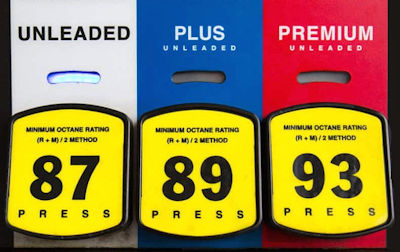

Mobile users:
For best results, view in Landscape mode.

Octane rating is the number given for the resistance
of the gasoline to ignite.
The higher the rating, the harder it is for the gasoline
to burn.
Older cars use carburetors to regulate
the air and gas mixture for the engine.
In order for these engines to run efficiently the carburetor
needed to be adjusted.
If the adjustments were not made the engine would knock.
In order to reduce knocking without manual adjustment
of the carburetor higher-octane gasoline would be
used.
After the mid 1980's engine designs began using computer
assisted fuel injection to accurately control the air/fuel
mixture.
Because of this change, then you might think that Octane
rating is not needed.
In newer cars, octane rating is still very important in reducing
engine damage.
Some cars do not recommend using any gas below a specific
rating, while other cars do not recommend going above
a specific rating.
Today's cars are often precisely engineered for performance
driving and the engine compression ratio is tuned accordingly.
With an engine designed to such standards then you have a
smaller range of acceptable octane rating you car will perform
efficiently with and not cause any engine damage.
Check your owner's manual for details on your cars fuel
system.
Many people believe that if you increase the octane level you
will get better performance. This is not entirely true.
If your engine is knocking then increasing the octane may reduce
or eliminate the knocking and give you a small amount of
increased performance.
Another common method of increasing
performance is to increase the timing.
Increasing the timing will provide a small amount of power
boost, but it also means that you will need
to start using a higher-octane gasoline.
There are natural variables that may cause you to want to adjust
your gasoline.
Altitude, humidity, and air temperature can cause slight changes
in engine performance.
If you have changed your gas to a higher octane, or if you
are using the recommended rating, and knocking still exists
then there may be some other problems.
You may want to have the knock sensors checked to see if
they are working correctly.
Deposits can also cause engine knock to continue.
You may want to look at ways to clean the engine.
Get a tune-up, replace your catalytic converter, or just
some time driving on the highway with occasionally
pushing the engine to clean out the engine.

